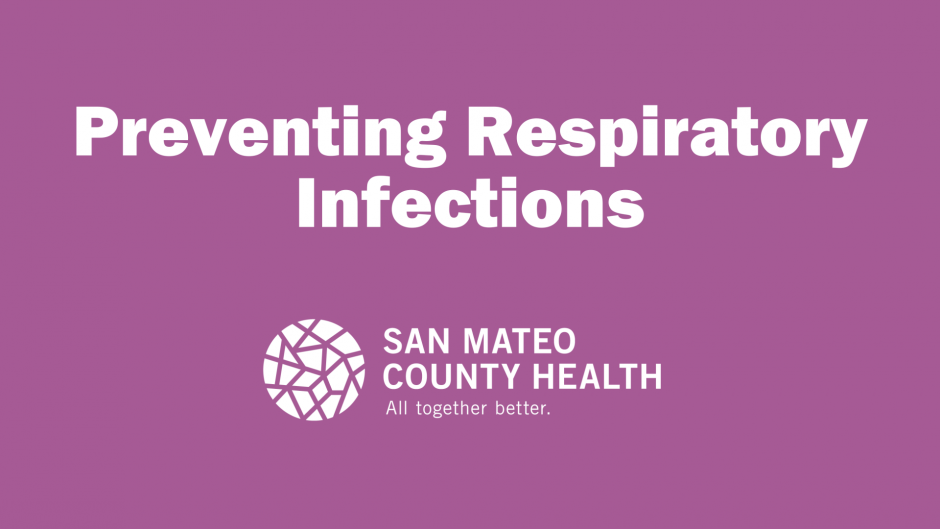Preventing Respiratory Infections
Families can successfully prevent upper respiratory infections (URIs) caused by viruses common in the winter. The sharp rise of influenza and RSV activity in San Mateo County, along with increasing COVID transmission in California, is causing widespread illness, sometimes requiring hospitalization.
Which viruses are circulating in San Mateo County?
While COVID-19 is still affecting many people in San Mateo County, there is an early (in the winter season) increase in two important respiratory viruses – influenza (“High” level in CA) and RSV (respiratory syncytial virus). Other respiratory viruses (such as rhinovirus, adenovirus, parainfluenza, human metapneumovirus) are typically milder, causing uncomfortable “common cold” respiratory-tract symptoms for 1-2 weeks.
How to prevent infections and severe disease?
Vaccination with the updated COVID booster and the annual flu vaccine are effective for preventing infections and very effective for preventing severe disease.
COVID vaccines and boosters are widely available from health care providers, pharmacies, and from County Health. See COVID vaccine locations and schedules here (MyTurn) and here (County Health pop-up clinics).
Flu vaccines are also available from health care providers and from County Health. See flu vaccine locations and schedules here (MyTurn) and here (County Health pop-up clinics).
As respiratory viruses are circulating widely in our communities, prevent infections by limiting exposure to respiratory droplets.
- Large droplets (carrying influenza, RSV, or COVID virus) can settle onto surfaces and objects and spread by close contact. Prevent transmission of large droplets by washing hands, avoiding touching your face, covering coughs, and cleaning surfaces.
- Very small droplets (carrying COVID virus) are exhaled into the air farther than six-feet. Prevent airborne transmission by limiting the number of people indoors, improving ventilation (opening multiple doors & windows) and wearing a mask (N95 respirator) to protect yourself.
What are the symptoms?
Symptoms caused by the many respiratory viruses are similar, which may include runny nose, cough, and sore throat.
COVID and influenza viruses infect the respiratory tract (nose, throat, lungs) and can also severely affect other parts of the body, causing fatigue, headache, muscle/body aches, nausea/vomiting, diarrhea, and/or fever. For COVID-19 and flu infections, tests and antiviral drugs are available — especially useful for people who are at increased risk of complications (older adults, people with certain underlying medical conditions, people who are pregnant). People who are concerned with worsening symptoms and those with underlying medical conditions should consult their health care provider.
RSV (respiratory syncytial virus) is a common respiratory virus that usually causes mild, cold-like symptoms. Although most people recover in a week or two, RSV can be serious, especially for infants and older adults. RSV is the most common cause of bronchiolitis (inflammation of the small airways in the lung) and pneumonia (infection of the lungs) in children younger than 1 year of age in the United States. Some may need to be hospitalized if they are having trouble breathing or are dehydrated. There is no antiviral treatment for RSV. For additional information from the California Department of Public Health (CDPH), visit the RSV information page.
For those with symptoms of a respiratory virus infection:
- Stay home until symptoms are mild and improving (and at least 5-10 days for COVID). This includes waiting until 24 hours have passed since resolution of fever without the use of fever-reducing medications. On average, people are contagious with COVID for about 8 days after their symptoms begin. People with flu are most contagious in the first 3-4 days of illness. People with RSV are usually contagious for 3-8 days.
-
Test for COVID. If you have symptoms, test immediately.
There are two main types of viral tests: antigen tests and PCR
tests.
- Rapid antigen tests produce results in 15-30 minutes. These self-tests for COVID are conveniently available, including over-the-counter at retail stores, pharmacies, and some schools. Tests cost $7 – $12 and are reimbursable through your health insurance.
- PCR tests are performed in laboratories. They are more reliable (sensitive) than antigen tests, particularly for people without symptoms. Info about PCR is available through health care providers and https://covid19.ca.gov/get-tested/.
For someone, such as a young child or an elderly adult, with worrisome symptoms or a high risk for severe disease, contact a health care provider, who can test for COVID, influenza, RSV, and other illnesses.
- While COVID guidelines recommend that infected persons wear a well-fitting mask around others for a total of 10 days, masking prevents infections by other respiratory viruses too. Students who have returned to school with some mild and improving symptoms, such as runny nose and cough, should wear a mask to protect their classmates from all the respiratory viruses.
